What Harris's years as a prosecutor reveal about who she is now
- Published
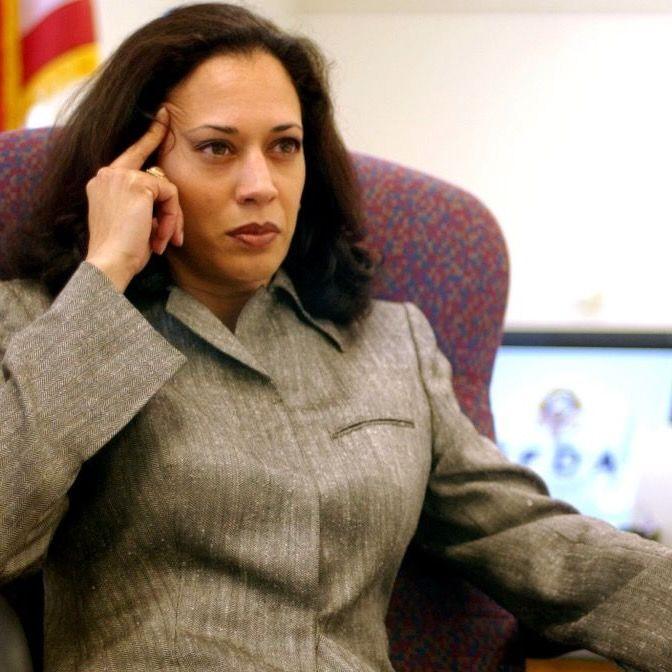
Just over three months ago, Vice-President Kamala Harris walked up to a microphone to make a speech that would define both her past and her future.
A day before, President Joe Biden had dropped out of the election race and endorsed her to succeed him as Democratic candidate. With only a short period of campaigning ahead of her, Harris had no time to waste.
There is a saying in politics: define yourself or be defined by your opponent. And in that moment, when Harris made her first pitch to the American people, she defined herself not just in terms of her record in the White House or as a US senator, but the years she spent as a California prosecutor.
“I took on perpetrators of all kinds - predators who abused women, fraudsters who ripped off consumers, cheaters who broke the rules for their own gain. So, hear me when I say: I know Donald Trump's type,” she said of her Republican challenger.
The line has been repeated often at her campaign rallies and stump speeches, as the 60-year-old has sought to frame this election as a contest between a hard-bitten prosecutor and a convicted felon, constantly reminding voters of Trump’s legal troubles.
But a look back at Harris’s time in and out of California's courtrooms reveals her enduring struggle to define herself, what her opponents say is a history of pivoting on issues depending on the political weather, as well as her uncanny ability to seize the moment when others have counted her out.
Street murders and rough San Francisco politics
Harris’s time in law enforcement began just out of law school in Alameda County, California - which includes the cities of Berkeley and her hometown of Oakland.
During the 1990s, in the midst of the government's "war on drugs", Oakland struggled with violent crime.
For a junior prosecutor, the job was daunting. But the severity of the cases you had to deal with meant it was considered a top job for a young and ambitious attorney, said Teresa Drenick, who worked with Harris at the time.
“It was like a potboiler of an atmosphere. The amount of grief and agony you ingested every day was hard to process. For us, it was intense. The stakes being high, the crimes being so serious,” she told the BBC.
"It was near the height of the crack-cocaine epidemic. There were gang murders, street corner murders taking place. There was a lot going on in Oakland that enabled you as a prosecutor to handle some of the most serious cases that a prosecutor is ever going to handle."
Ms Drenick and Harris were on the same trial team together. She admired Harris’s confidence in front of a jury, and her respect for her colleague only grew when Harris was transferred to a different team in the same courthouse focused on child sexual assault.
"She was very, very caring of victims of child abuse. She was able to speak to them in a way that allowed them to open up to her,” she said.
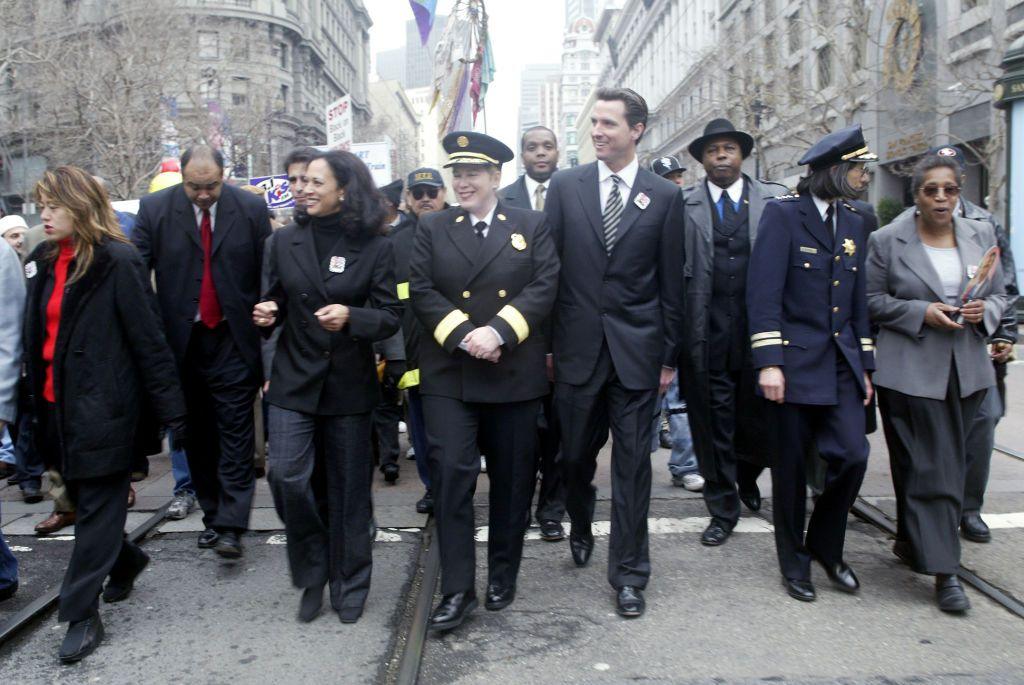
Kamala Harris made her way through California politics at the same time as Gavin Newsom (fourth from right), the current governor
It was at this time that Harris dated Willie Brown, a local political kingmaker and speaker of the California State Assembly who helped launch the careers of some of the state’s other most prominent political leaders, including Gavin Newsom, the current governor, and San Francisco Mayor London Breed.
Brown appointed her to two state boards and introduced her to some of San Francisco’s highest-profile Democratic donors. The short-lived romance ended by the time Brown was elected as the city’s mayor in 1995. Three years later, Harris took a job at the San Francisco district attorney’s office.
During her relationship with Brown, who was 30 years her senior, Harris had begun mingling with some of the city’s political heavyweights.
San Francisco's political machine, which Harris has described as “a bare-knuckled sport”, has launched the careers of some of the nation’s biggest political stalwarts including former House Speaker Nancy Pelosi and the late Senator Dianne Feinstein.
Harris forged relationships with both of them, rising alongside contemporaries like Newsom, as she found her feet in the political world.
Her swift rise through San Francisco’s rough-and-tumble politics were defined by days in courtrooms representing victims and nights at glitzy political galas.
This was also around the time that Harris met one of her closest friends – and most significant donors - billionaire philanthropist Laurene Powell Jobs.
Jobs, who was married for decades to the late Apple co-founder Steve Jobs, donated $500 to Harris’s 2003 campaign for San Francisco district attorney, which she won, toppling the man who had hired her. Twenty years later, the wealthiest woman in Silicon Valley donated nearly $1m to the Biden-Harris re-election campaign, according to Fortune Magazine. It’s not known how much she has directly contributed to Harris’s bid for the presidency, but the amount is considered substantial.
‘No exception to principle’
On the day before Easter in 2004, just four months into Kamala Harris’s tenure as the district attorney of San Francisco, a gang member brandishing an AK-47 rifle fatally shot a 29-year old police officer named Isaac Espinoza.
The slaying stunned the city, with many politicians and prominent members of the police calling for the death penalty.
But Harris, who had made opposition to capital punishment a key part of her political campaign to become the city’s top prosecutor, instead decided to pursue a life sentence without parole. She made her decision public just 48 hours after the murder, without informing the widow first.
“She did not call me,” Renata Espinoza told CNN in 2019. “I don’t understand why she went on camera to say that without talking to the family. It’s like, you can’t even wait till he’s buried?”
The backlash was swift. Speaking at the officer’s funeral, Senator Feinstein demanded his killer “pay the ultimate price”. While walking out of the church service, she told reporters that had she known Harris, external was against the death penalty, she probably wouldn't have endorsed her.
“[T]here can be no exception to principle,” Harris later wrote in an opinion piece, external in the San Francisco Chronicle, defending her decision.
Long-time civil rights attorney John Burris, who supported Harris’s decision at the time, said he thought it was “politically was not wise for her, but it was a philosophical position she took”.
"She was pretty bold in her position and she did take a lot of heat for it,” he told the BBC. “That was a pretty progressive stand.”
The incident could have been the end of her political ambitions, but Harris, who had grown up with a single mother in the working-class city of Oakland, carried on.
“Is she a political animal? Absolutely not. Is she naturally skilled? Yes,” said Brian Brokaw, who managed Harris’s two successful campaigns for California attorney general in 2010 and 2014. “For her, politics is the means to the end. She is focused on the end result and the impact she can have on people’s lives less than the process.”
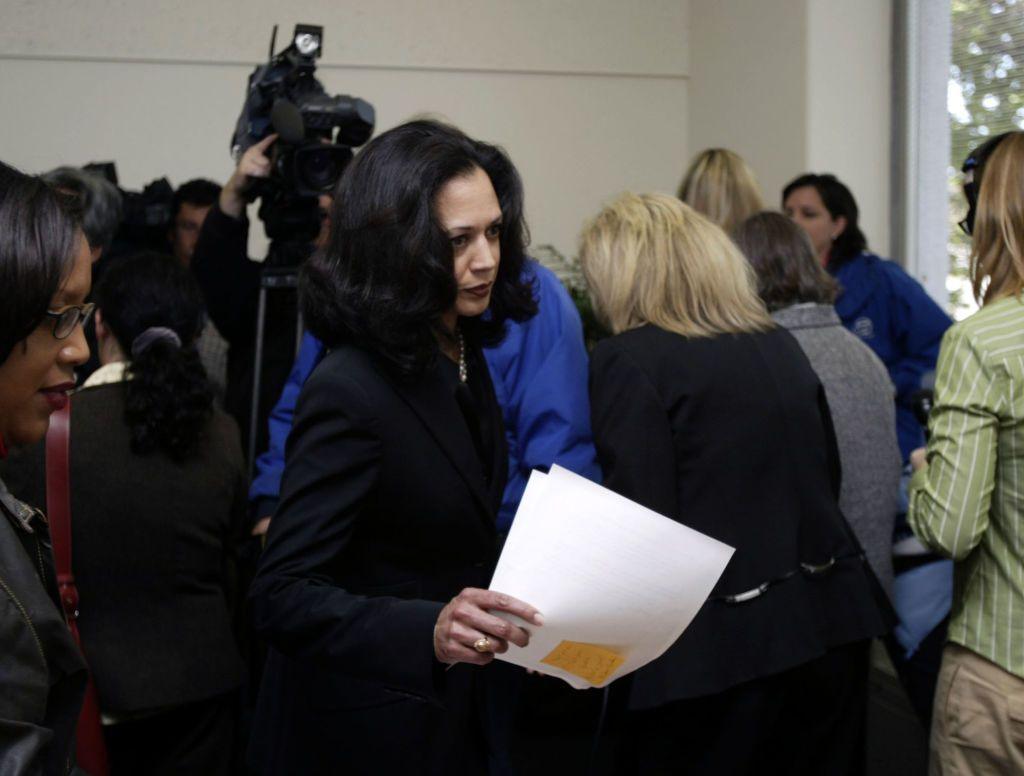
Then-District Attorney Kamala Harris seen after announcing at a news conference that she would not seek the death penalty for a policeman's killer
Harris seemed to absorb some lessons from her first major decision as San Francisco district attorney. Four years later, she again declined to pursue the death penalty after a dramatic killing, but this time, she better understood how her decision would reverberate.
Tony Bologna had been driving in San Francisco with his three sons when their vehicle was barraged by gunfire. Bologna and two of his sons were killed; his third son was critically injured.
Shortly after the killing, police arrested Edwin Ramon Umaña, an undocumented member of the MS-13 gang who had evidently mistaken the 49-year old Bologna for a sworn enemy.
This time, Harris opted to deliver the difficult news about her prosecutorial decision to Bologna’s widow Danielle herself, recalls Matt Davis, who was representing Danielle Bologna in a civil suit against the city at the time.
“It was no surprise that Danielle had a very strong, negative reaction to the news,” Mr Davis told the BBC in a recent interview. “She made it clear that she was upset, and Kamala listened to her and expressed her sympathies but stayed pretty firm.”
The meeting left an indelible impression on Davis. He had befriended Harris in law school in San Francisco, and when she had first revealed her plans to run for D.A., he remembers thinking she didn’t have a chance.
But he says that painful conversation made him realise he had underestimated her.
“That was not an easy thing to do,” Mr Davis said.
Progressive prosecutor?
Over the span of her law enforcement career, Harris’s allies sought to paint her as a “progressive prosecutor” committed to criminal justice reform but also tough on crime.
It was a fine line to walk in a liberal city in the country’s largest left-leaning state, and one that critics on both sides of the political aisle say she did not stick to.
As district attorney, she adopted a so-called “smart-on-crime” philosophy, which included initiatives to keep non-violent offenders out of prison by steering them into job training programs and ensuring young offenders remained in school.
Niki Solis, an attorney in the San Francisco public defender’s office who worked opposite Harris in the early 2000s, said she had been receptive to her concerns about how young victims of sex trafficking were being charged with prostitution, as opposed to being treated as victims.
“I realised that she understood issues that a lot of her predecessors and a lot of [district attorneys] up and down the state failed to understand or even acknowledge,” said Ms Solis.
Trump and his allies on the right have sought to play up this time in her career, depicting her as part of a “San Francisco liberal elite”. But on the left of politics, she has been accused of not being reform-minded enough, with some on social media nicknaming her “Kamala the cop”.
But by the time Harris was elected as California’s attorney general, in 2010, her progressive tendencies appeared to have given way to political pragmatism.
"She was seeking more of a national profile. She wanted to make a mark. There was definitely an expectation of an interesting future to come,” said Gil Duran, who worked for Harris in the attorney general’s office for a few months.
"The attorney general - usually a sleepy backwater of an office - was now home to a rising star."
On the national stage, Harris began to make her mark. In 2012, in the aftermath of the global financial crisis, Harris threatened to walk away from negotiations on a financial settlement between state attorneys general and five US banks. California was set to receive around $4 billion in the initial deal, and Harris eventually secured $18 billion for the state.
The Harris campaign has highlighted this case on the campaign trail as more proof she’s willing to stand up to powerful interests.
But more recent reporting shows that only $4.5 billion of the settlement ended up going towards California homeowners who had been ripped off by lenders.
In moves that angered some liberals, she implemented a school truancy program state-wide, which some county prosecutors used to arrest parents. And she defied a Supreme Court order to reduce overcrowding in the state’s prisons.
She also reversed her previous position on the death penalty in 2014 when, as attorney general, she appealed a lower court’s ruling that found it was unconstitutional. Now, the prosecutor who once refused to sentence violent murderers to death on the basis that "there is no exception to principle" was defending the state’s right to do just that.
Hadar Aviram, a criminal justice and civil rights professor who petitioned Harris to leave the decision in place, was one of many critics of her stance.
“You are not under any obligation to defend things that are morally unjust,” she told CNN in 2019 of the episode. “If you truly believe that they’re morally unjust and you have an opportunity to take a stand, I think it’s an imperative to do so.”
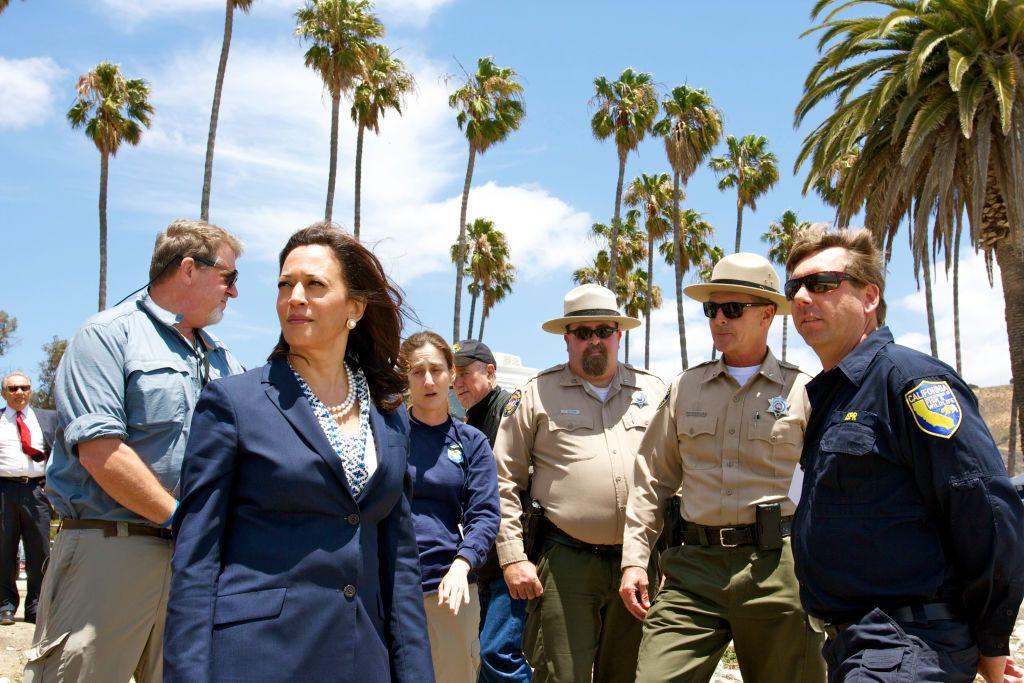
Former San Francisco city attorney Louise Renne, who worked with Harris when she first left Oakland, said the torrent of criticism she faced over her support for the death penalty was unfair.
“The thing is when you’re state attorney general, you have to defend the law. That’s your obligation,” she told the BBC. “ I don’t regard that as a weakness or a valid criticism at all.”
But Harris was selective about which laws she enforced. In 2004, when Gavin Newsom, then San Francisco's mayor, decided to allow same-sex weddings, in violation of state law, Harris helped officiate a few of the ceremonies, calling it “one of the most joyful” moments of her career.
Her long record as a prosecutor would prove tricky when, after being elected to the US Senate in 2016, Harris decided to run for the Democratic presidential nomination.
She chose to kick off her 2020 presidential run just blocks away from the Alameda County Courthouse, the same place where she first uttered the words, “for the people” – which would become part of her campaign slogan.
But her past defence of the death penalty, and resistance to prison reform, earned her criticism from her party’s left-flank. She dropped out of the presidential race before the primary contests to choose a Democratic contender had even begun.
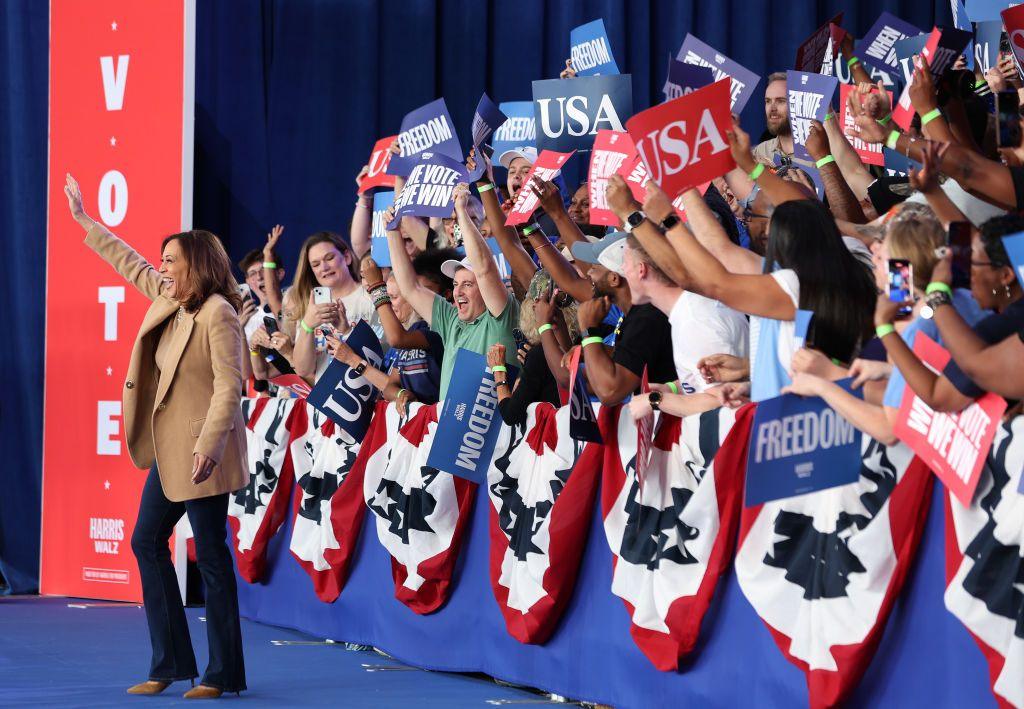
Reinvented again
Now, as Harris campaigns for president against Donald Trump, she is again calling attention to her prosecutorial bona-fides, but reframed in a new political atmosphere.
While many cities, including San Francisco, experimented with progressive police reform after Floyd’s murder, a spike in crime and homelessness during the pandemic has triggered a public backlash against so-called “soft on crime” policies. Republicans have also heavily focused on political messaging around crime and public safety in recent years.
Harris’s past as a prosecutor is no longer such a liability, and in a race against the first former president to be convicted of felony crimes, the narrative aligns with the political moment.
Notably, at the Democratic National Convention this summer, abolishing the death penalty was dropped from the party platform.
And while in 2020, Harris was trying to win over left-leaning Democrats, she is now explicitly making a pitch for moderate Republicans who may be fed up with Trump. To do that, she has shifted a number of her positions - from border security to single-payer health care - to the centre.
This has led to accusations from her opponents that she is a flip-flopper.
She’s “a chameleon”, Trump’s running mate and Ohio Senator JD Vance told CNN in August. “She pretends to be one thing in front of one audience and she pretends to be something different in front of another audience.”
But Mr Duran, Harris's former colleague in the attorney general’s office, sees it less as a matter of political scrupulousness and more simply a sign of her political pragmatism.
"I think she does have conviction but it’s really hard to run a campaign on your convictions alone, for the most part,” he said. “The Kamala Harris we’re seeing now is very much poll and focus-group driven.”
What Harris really stands for has been a question that has dogged her throughout her career - and continues to follow her on her bid for the Oval Office. But to Mr Brokaw, her former campaign manager, she has always operated on her own terms.
“She has carved her own path and left a whole bunch of people behind who counted her out and underestimated her,” he said.
Correction 19 November: This article was amended after a previous version incorrectly stated that Harris dropped out of the 2020 presidential primary after George Floyd was murdered. In fact she had already dropped out before his death.

SIMPLE GUIDE: When is the US election and how does it work?
EXPLAINER: What Harris or Trump would do in power
REAL STORIES: The moment these Americans decided who to vote for
PATH TO 270: The states they need to win - and why
IN PICS: Different lives of Harris and Trump